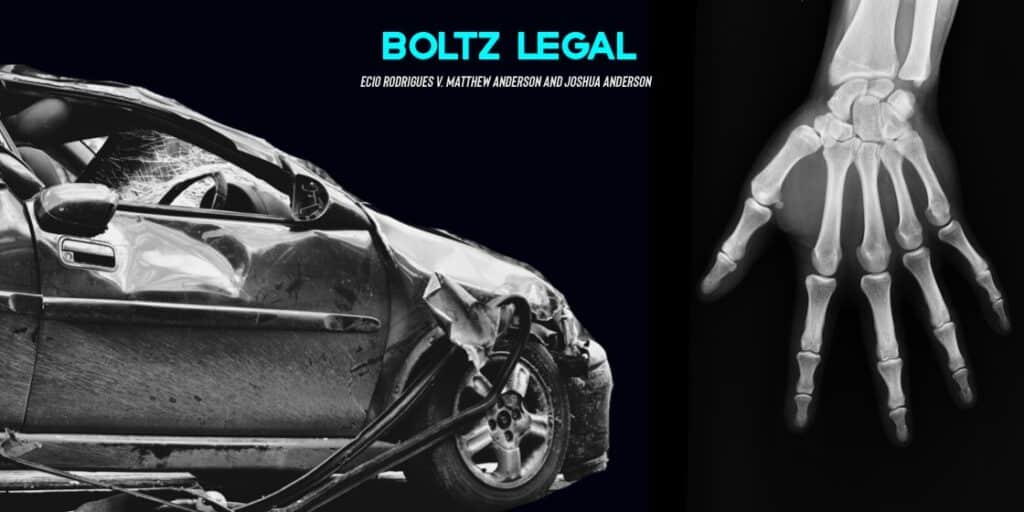Jurisdiction: Fifth District Court of Appeal, Florida
Case No.: 5D2024-0180
Lower Tribunal Case Nos.: 2020-CA-16579, 2020-CA-16581
Date: August 22, 2025
Lower Court: Circuit Court for Brevard County, Judge George W. Maxwell, III
Background: A Collision, Injuries, and Disputed Damages
This case arose from a 2018 automobile accident in which Ecio Rodrigues, while driving his vehicle, collided with a car carrying Matthew and Joshua Anderson. Rodrigues admitted fault for causing the crash, but he disputed the extent of the injuries and damages claimed by the Andersons.
The Andersons alleged permanent injuries—including neck and lower back injuries, disc herniations requiring cervical fusion surgeries, carpal tunnel syndrome, and mild traumatic brain injuries. Rodrigues, represented by counsel appointed through his automobile insurance carrier, challenged the claims, arguing that any injuries were exaggerated, temporary, or unrelated to the crash.
Before trial, the court issued orders restricting references to insurance coverage and directing jury instructions that acknowledged Rodrigues’s negligence but left causation and damages for the jury to decide.
Trial Court Proceedings: Conflicting Testimony and a High-Dollar Demand
The trial lasted nine days. Both sides presented conflicting expert testimony on the severity and permanency of the Andersons’ injuries.
- Plaintiffs’ demand: Over $28 million combined for permanent injuries and non-economic damages.
- Defense’s position: Compensation should be limited to past medical expenses of approximately $63,000 total, reflecting temporary injuries that should have healed within weeks.
The jury ultimately sided with the defense. They awarded past medical expenses in the amounts Rodrigues’s counsel suggested and found no permanent injury, meaning the Andersons received no non-economic damages.
The Appeal: Improper Comments and Hollenbeck v. Hooks
After the verdict, the Andersons moved for a new trial, arguing that defense counsel’s references to Rodrigues as “the defendant,” acknowledgment of fault, and related comments during voir dire improperly suggested Rodrigues himself—not his insurer—would bear financial responsibility for any judgment. They relied on Hollenbeck v. Hooks, a 2008 case where the First District reversed a verdict because defense counsel had improperly appealed to juror sympathy by misrepresenting the defendant’s financial situation.
The trial court agreed with the Andersons, granted a new trial, and adopted—verbatim—the plaintiffs’ proposed order.
Rodrigues appealed, arguing that the statements were truthful, innocuous, and consistent with established jury instructions. He also argued the trial court’s order lacked the necessary specificity and failed to show that the verdict “shocked the conscience,” a key requirement for overturning a jury verdict on manifest weight grounds.
Appellate Court Ruling: No Misrepresentation, No Basis for New Trial
The Fifth District Court of Appeal reversed. The appellate court emphasized several key points:
- Truthful Statements Are Not Misconduct. Defense counsel properly referred to Rodrigues as “the defendant” and confirmed he accepted fault. These were factual acknowledgments consistent with the court’s jury instructions.
- Hollenbeck Did Not Apply. Unlike in Hollenbeck, where defense counsel misrepresented the defendant’s financial vulnerability, no such misrepresentation occurred here. Rodrigues’s counsel never implied he would personally pay damages or mentioned insurance coverage.
- Conflicting Evidence Is for the Jury. Because both sides presented sharply conflicting medical testimony, the jury had discretion to weigh credibility and evidence. Florida law recognizes that a verdict is not against the manifest weight of the evidence simply because evidence was disputed.
- Trial Court’s Order Lacked Specificity. The order granting a new trial failed to detail why the verdict was shocking or unjust. Without clear reasoning, appellate courts cannot uphold such rulings.
As a result, the appellate court reversed the trial court’s decision and reinstated the jury’s verdict in favor of Rodrigues.
Key Legal Takeaways
- Jury verdicts must be respected when supported by conflicting evidence. Courts cannot overturn a verdict simply because they might have ruled differently.
- Improper sympathy arguments remain prohibited, but referring to a client as “the defendant” does not constitute misconduct.
- Orders granting a new trial must be specific. Judges must clearly explain why a verdict was against the manifest weight of evidence, or appellate courts will reverse.
For accident victims, this case highlights the importance of evidence in proving permanent injuries. Insurance carriers and defense attorneys will often challenge claims of permanency, meaning plaintiffs must prepare for disputes that go beyond establishing fault.
Related Reading from Boltz Legal
- Maximizing Compensation: Strategies for Florida Car Accident Diminished Value Claims
- The Critical First 10 Minutes: What to Do Immediately After a Car Accident
- What Happens When Filing a PI Claim
- What to Expect During a Lawsuit
Today’s Insight
“Facts do not cease to exist because they are ignored.”
— Aldous Huxley
This case is a reminder that while arguments can shape perception, evidence remains the cornerstone of justice. When juries are presented with conflicting testimony, their role as fact-finders must be respected—unless the verdict is truly against the clear weight of the evidence.

